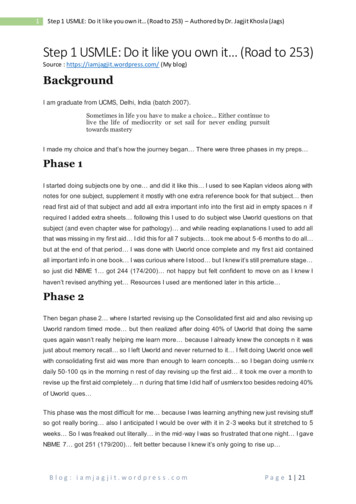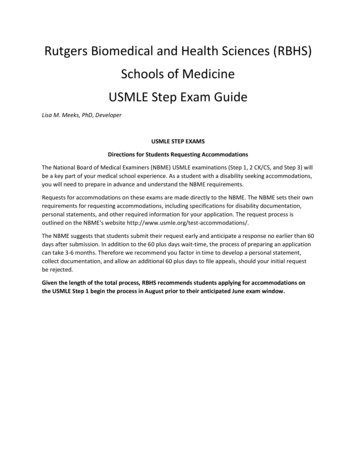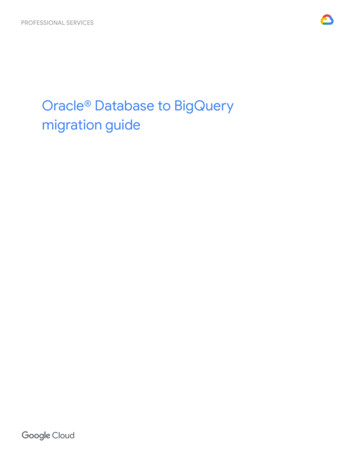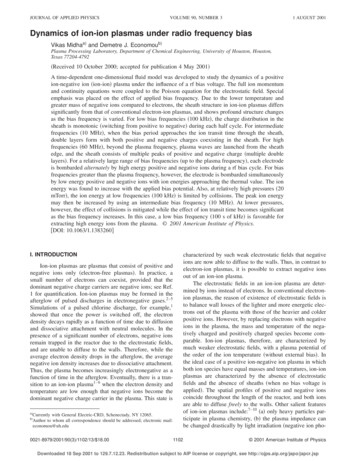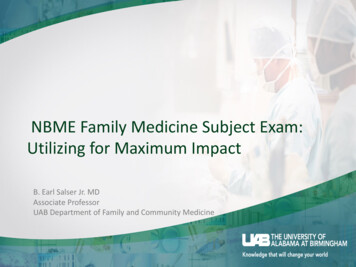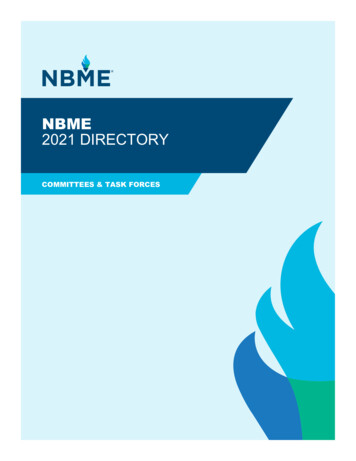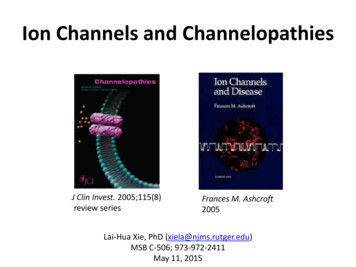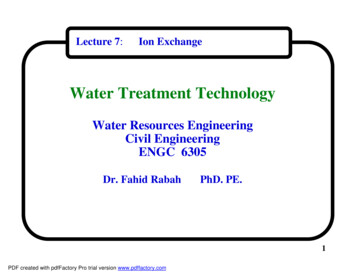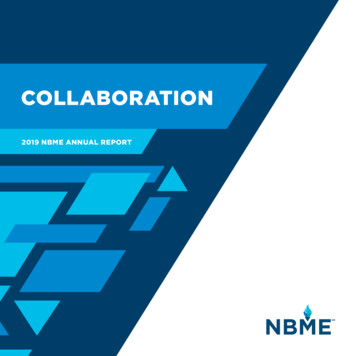
Transcription
Collaboration2019 NBME ANNUAL REPORT
Table of Contents2Leadership Insights4Gaining Momentum6Collaborating for Progress12Improving Assessment14Supporting the Community16Talent and Recognition22Program Highlights28Membership &Members of Committees
leadershipinsightsOur Journey:From Realization to RecommitmentThree years ago, we starteda journey to take a fresh lookat today’s medical educationand health care systemthrough the eyes of ourstakeholders—the educators,students, regulators,physicians, and partners wesupport with high-qualityassessments. Our desire was,and still remains, to ensurethat the services we bring forward fulfill the evolvingneeds for health professionals today and into the future.The wide and rich variety of input sought across thehouse of medicine deepened in 2019. Frankly, it hasrequired humility to learn the diverse perspectivesand strength to internalize the feedback. From theInvitational Conference on USMLE Scoring (InCUS) tothe hard look at our lagging technology, the journeyhas inspired a fresh strategic road map with focusedinitiatives and accelerated deliverables. We do this forall health professionals to serve their needs, at the right22019 NBME Annual Reporttime, with the right tools. Many of you have commentedthat you were surprised and inspired by the exploration,collaborative problem solving, and expertise of our NBMEteam. Our teams are energized by the opportunitiesidentified and are already delivering solutions in some ofthe areas where NBME has room to grow.In this NBME Annual Report, Collaboration, we share withyou a summary of our progress in 2019. We also offer aglimpse into potential directions for the years to come.Our objective, of course, is to better serve everyone—from the students who sit for our exams to the patientsthey will treat.We remain more committed than ever to innovatingand improving through collaborative exchanges,contributions to enhance the science of assessment, andprograms that further support our community.Peter J. Katsufrakis, MD, MBAPresident and Chief Executive Officer
Diversity of Voice and ExperienceI am honored and privilegedto assume the role of NBMEChair at this most eventfultime in its history whenmany of the changes set inmotion in recent years arecoming to fruition. The firstset of crucial initiatives arenow working well becausethey were started for thebest possible reason—toserve the public, our patients, at the highest possible levelas we go forward.Behind the new initiatives and their execution isthe conscientious adherence to a wide-rangingcollaborative process involving all of NBME’sstakeholders. These stakeholders include individualsand organizations from across the United States andaround the world that cut across every aspect of thehouse of medicine. They, increasingly, include otherdisciplines and professions involved in achieving high-quality health care. The public perspective is alsogrowing and directly represented. By working with sucha wide variety of voices, NBME gains the experienceof each of these stakeholders. This diversity of voiceand experience is making a positive difference in theseefforts, and will continue to do so as health care changeaccelerates in the future.As NBME moves forward into that future, the ExecutiveBoard and I see not only the progress, but also theabsolute necessity of what the teams are doing. Havingserved this organization in a number of roles and on avariety of committees, I see a renewed passion at NBME.The momentum is definitely “on” as the organizationstrives to enable truly exceptional patient-centeredhealth care through state-of-the-art assessment.Alfred F. Tallia, MD, MPHNBME Chair2019 NBME Annual Report3
GainingMomentumSpringboard for Our MomentumIn 2019, we listened, learned, and committed toaccelerating improvements and innovation.Medical education and patient care are rapidly changing,and we recognize that in order to meet the near-termand future needs of our customers, we need to evolve.Progress last year included strategies to make abeneficial impact on our community: Weembraced collaboration with many health carecommunity members and subject-matter experts.42019 NBME Annual Report Weactively evaluated input from students, residents,educators, physicians, patient advocates, andregulators, whose insight and honesty were invaluable. Wealigned our organization to drive transformativeinitiatives for improved assessment design anddelivery and product management. Weenhanced and improved our infrastructure to makeour assessments easier to take and deliver, and manymore enhancements are in the works.
RelationshipsStrengthen NBMEMobilityMaking AssessmentsEasier throughRebuilt TechnologyTo deliver valid information about knowledge and skills,it takes the unique combination of experienced NBMEstaff working with representatives from a wide variety oforganizations who share our commitment to assessment.Together, we aim to create meticulously craftedassessments that embody the following attributes:At NBME, technology is an essential component ofthe products and services we provide. It’s the way ourexaminees engage with us, and the mechanism throughwhich they register, prepare, and take our exams. Relevantand continuously improved Diverseand specialized experience from the forefrontof medical education and patient care ProvenNBME processes, validation, and qualitymeasuresThe dedicated individuals’ valuable contributions arehighlighted in our Membership listing and CommitteeDirectory. They represent important voices across thehealth care spectrum. Through their stewardship withinand commitment to their respective fields, they enhancethe work we do in creating assessments.These relationships are meaningful and productive fromthe moment interactions with collaborators and partnersbegin. These interactions facilitate the development ofassessments grounded in evidence-based science ofobjective measurement of skills and knowledge. As a result,our assessments can support important decisions along thecontinuum of health professions education and practice.To develop enhanced, faster, and more user-friendlytechnology, NBME gathered feedback from individualsand organizations on areas for improvement. In 2019,we implemented several new systems that benefit ourusers by replacing outdated systems, growing onlinecapabilities, and improving our processes to make themeasier for the entire community to use. Examples include: Basedon feedback from students and residentsthrough focus groups and pilot trials, MyNBME wentlive in February 2019. MyNBME enables users to moreeasily register, purchase, launch, and view assessmentsand improves how exam feedback is accessed. Tobuild upon technology enhancements, onlineimprovements for 2020 include a MyNBME ServicesPortal for institutions. NBMEupgraded its assessment media player, usedfor displaying multimedia exam content in web- andcomputer-based testing, to address security andcompatibility issues. Aninnovative and advanced content management systemcalled Surpass now enables subject-matter experts tosecurely submit their test items and associated content.2019 NBME Annual Report5
COLLABORATINGFOR PROGRESSIn keeping with our founders’ collaborative spirit, working with others is key to fulfilling ourmission. Whether we are working alongside the Federation of State Medical Boards to supportlicensure assessment, or collaborating with the National Board for Health & Wellness Coachingto create the standard of competence for this profession, we value and incorporate the diverseexperience and expertise of others with the common goal of advancing assessment.NBME Looks Beyond Its Walls toEnable LearningIn 2019, NBME’s engagement withstakeholders reflected the role weplay for the community in a numberof ways—from actively participatingin conferences to increaseawareness, customer relationships,and product education to hostingresearchers’ presentations in ourPhiladelphia office:62019 NBME Annual Report InNovember 2019, NBME staffattended Learn Serve Lead,the Association of AmericanMedical Colleges’ (AAMC)Annual Meeting in Phoenix.Staff shared our best practicesfor test item materials andworkshops, gathered informationabout needs and experiences,and piloted program andproduct enhancements, suchas the Customized AssessmentServices. In addition, NBME’sPeter Katsufrakis, Michael Barone,and Aggie Butler provided anorganizational overview. MichaelBarone also presented an updateabout the scoring of USMLE Step 1.
Overa dozen thought-leaders inmedical education throughoutNorth America and Europegathered at NBME to explorehow best to support a globalculture of assessment. The GlobalMedical Education AssessmentHorizons meeting fostered aninformation exchange aboutthe current state of assessment.Participants brainstormed toidentify potential opportunitiesto expand the horizons ofassessment of health careprofessionals. The discussionsfrom this meeting will help informNBME’s ideas for research,innovation, and strategicdirections. MargaretM. Luciano, PhD, MBA,an expert in team dynamics,multi-team systems, andimproving team effectivenessin health care, visited NBMEin November to discussher research in Issues inHealthcare Systems. This typeof presentation enables NBMEto remain connected to thelarger issues that impact medicaleducation and underpin therealities of health care every day.Our Vital NationwideFaculty of MedicineOur nationwide faculty of medicinecomprises hundreds of subjectmatter experts. They are to becommended for their selflessdedication to measuring health careknowledge and skills. This uniquebody is vital to keeping NBMEassessments robust and relevant.Those who participate on advisorypanels, such as the USMLE MedicalStudent and Residency AdvisoryPanel or the State Board AdvisoryPanel to USMLE, provide thefeedback needed to remain engaged,address issues, and make decisionson how best to serve customers,students, and practitioners.The committee members who writeand review our test items for ourlicensure, certification, and medicalschool subject examinations arededicated to sharing their expertiseand learning best practices indeveloping test items for NBME.Our test development staff workalongside test item writers to helpimplement item and case writingstandards; thoughtfully edit formeaning and style; and tailor examcontent to assess the appropriatecompetencies for the right audience.Together, the committee membersand staff amplify the quality of ourexams, and our committee membersleave NBME looking forward to theirnext educational collaboration withus. Moreover, the benefits of thisunique editorial and educationalcollaboration for our faculty continueto grow with each passing year: Facultycan earn continuingmedical education (CME) creditfor their work. Memberscan access an extensivenetwork of professionals withinand outside of their fields; theserelationships allow for academicor clinical opportunities that theymight not otherwise find. Bywriting for and participatingin an editorial cycle, the subjectmatter experts are fully immersedin an authentic peer-reviewprocess, analogous to serving asan editor of an academic journalor authoring a scholarly article fora publication. Committeecollaborations canserve as catalysts for careeradvancement.2019 NBME Annual Report7
Webinars ExpandAudience ReachIn 2019, NBME hosted several webinars to foster deeperinteractions with medical school faculty and students.These webinars provided opportunities for faculty andstudents to learn about NBME products and services.They also provided a forum for our staff to engage inmeaningful dialogue about our assessment servicessuch as Customized Assessments, the AmbulatoryCare Subject Examination, and comprehensive andsubject examination score reports. NBME also hosted alive webinar on USMLE score reporting to foster a richconversation about this important topic.New Health SystemsScience Exam Bridgesthe GapIn collaboration with the American Medical Association,the Health Systems Science Examination was madeavailable to all medical schools. This high-quality,standardized assessment supports the implementationof health system science curricula and educationalinitiatives. Together with clinical and basic scienceinstruction, this new assessment prepares medicalstudents for effective clinical practice during residencyand throughout their careers.82019 NBME Annual ReportHealth and WellnessCoaching Field SeesGrowthNBME has been collaborating with the National Boardfor Health & Wellness Coaching (NBHWC) since 2016to create and administer a national board certificationassessment for health and wellness coaching. In 2019: NBHWCreceived a grant from the Centers for DiseaseControl and Prevention for a coaching programdesigned to help prevent or delay type 2 diabetesmellitus. The organization will partner with theAmerican College of Preventative Medicine to developgroup coaching competencies, a training program, anda certificate examination to advance this work.The American Medical Association approved the use ofnew Category III Current Procedural Terminology (CPT )Codes for health and wellness coaching beginningin January 2020. NBHWC and the US Department ofVeterans Affairs (VA) applied for these new trackingcodes to be based off NBHWC standards, and the VAplans to utilize them to evaluate the effectiveness ofcoaching within its health care system. As the VA usesthe new codes to track services provided by coacheswho are trained by the VA and certified by the NBHWC,both organizations hope to increase recognition of thevalue of health and wellness coaching in improvingpublic health.
Invitational Conference on USMLE Scoring (InCUS)In early 2019, NBME co-sponsored the InvitationalConference on USMLE Scoring (InCUS) to collaborativelyreview the USMLE program’s practice of numeric scorereporting within the context of its primary use (initialmedical licensure), and to discuss secondary uses ofscores, such as residency selection.The meeting was also co-sponsored by the AmericanMedical Association, Association of American MedicalColleges, Educational Commission for Foreign MedicalGraduates, and Federation of State Medical Boards.In all, 65 attendees participated in a professionallyfacilitated two-day meeting in order to connect, advise,and inform each other. Prior to the meeting, additionalinput was gathered from more than 200 organizationsto ensure that a complete range of perspectives wasconsidered. Areas of consensus include: Thecurrent medical school-to-residency transition is notmeeting stakeholders’ needs because each stakeholdergroup has optimized its part of the system over time. Unilateralchanges to USMLE will not “fix” the entiresystem, absent changes in other parts of the system. Changes—bothsystemic and specific to USMLE—must be explored, identified, and implemented on areasonable timeline.Four preliminary recommendations emerged from InCUSthat begin to address the complex challenges of a flawedsystem of residency selection.Stakeholders were invited to submit feedback aboutthe preliminary recommendations through an opencomment period. More than 20,000 responded to asurvey that accompanied the four recommendations.A summary of themes that emerged from InCUS andpublic commentary was published on USMLE.org in fall2019. These comments provided valuable input thathas helped to inform our efforts as we continue thisimportant conversation.In 2020, the USMLE program announced three futurepolicy changes: ChangingStep 1 score reporting from a three-digitnumeric score to reporting only pass/fail; Reducingthe allowable number of exam attempts oneach Step or Step Component from six to four; and Requiringall examinees to successfully pass Step 1 as aprerequisite for taking Step 2 Clinical Skills.Learn more about the policy changes on USMLE.org.2019 NBME Annual Report9
Reimagining Assessment PracticesWhen Amy Morales, Director of Test MaterialsDevelopment at NBME, attended a meetingof the Committee on Clerkship Directors ofthe Association for Surgical Education (ASE)in April 2017, she learned a hard truth: thecommittee was unhappy with the Surgerysubject examination. Its content did not alignwith the core curriculum for surgery.This could have hurt the relationship betweenNBME and the clerkship directors, but instead,it strengthened it. Listening to the clerkshipdirectors’ concerns sparked the reimagining ofhow to better align the Surgery subject examwith the curriculum. NBME realized that theexam questions needed to be curated moreclosely by the surgeons who best understoodthe subject matter, and who could ensurethat the exam content aligned with the corecurriculum.From that original conference, Marc de Moya,MD, Chief of Trauma/Acute Care Surgery atthe Medical College of Wisconsin/FroedtertHospital, invited Amy to attend the American102019 NBME Annual ReportCollege of Surgeons (ACS)/ASE MedicalStudent Core Curriculum Steering Committee.In that meeting, Amy was introduced to theindividuals responsible for developing thenational surgery curriculum and learned moreabout the core topics.The next improvement in the collaborationwas for NBME’s Test Development staff tohost an item-writing workshop and itemreview session in Philadelphia. There, CarlyDaniels and Miranda Gipe sat down with 13surgery clerkship directors to teach thembest practices for writing multiple-choicequestions. Afterward, the surgeons wrotenew Surgery subject exam content and vettedexisting content. Typically, new subject examcontent is reviewed remotely by clerkshipdirectors, so this was a different approach.Many of the writers noted that it was helpfulto be in the room with one another becausethe conversations that took place providednew perspectives, and at times, resulted inmaking decisions they would not have madehad they reviewed the content alone.
“It has been a fantastic collaboration. NBME’s opennessto improving the Surgery subject exam has beenimpressive. Working with NBME has been a personalpleasure. I’ve learned a great deal.Jesse Moore, MD“When you have a group of people in a room,that collective voice is helpful,” Amy said.“Additionally, it creates an environment thatenables editorial staff to interact with subjectmatter experts and ask questions. There islearning on both sides.”This collaboration has now evolved into an NBMEtask force that writes and reviews new examcontent. Jesse Moore, MD, an Associate Professorof Surgery at the Larner College of Medicine atthe University of Vermont, chairs the group. Heunderscored the richness of this collaboration.“It has been a fantastic collaboration. NBME’sopenness to improving the Surgery subjectexam has been impressive,” he said. “Workingwith NBME has been a personal pleasure. I’velearned a great deal.”And for NBME, the feeling is mutual.“There’s no way that we could create a qualityproduct if we didn’t have the subject matterexperts work together with us,” Amy said.“Collaboration is not just an enhancement ofwhat we do, it’s essential to what we do.”We take pride in collaborating with medical education professionals whosevalues echo our own. Their experience and expert viewpoints respectfullychallenge, and ultimately deepen, our commitment to innovating andimproving our offerings.2019 NBME Annual Report11
improvingassessmentIMPROVING ASSESSMENT THROUGHRESEARCH AND DEVELOPMENTTo keep pace with rapid changes both in medical educationand in the delivery of patient care, NBME innovates tocreate new products and enhance existing ones. In doingso, we better meet the needs of our customers.In 2019, collaborations with University of Wolverhamptonand the University of Pennsylvania enabled NBME’sCenter for Advanced Assessment to develop capabilitiesbased on Natural Language Processing (NLP). Thesecapabilities have led to improved assessment practices:scoring of the patient note forUSMLE Step 2 Clinical Skills Examination combinesjudgments from licensed, board-certified physicianraters with NLP-based computer-generated scores.Use of NLP enables NBME to apply the best available Computer-assisted122019 NBME Annual Reporttechnology to ensure accuracy and validity for all ourexamination programs. Automaticgeneration of multiple-choice questiondistractors—incorrect yet plausible alternatives to thecorrect answer—can facilitate the test-item writingprocess. NLP enables review of existing test contentand the generating of a list of distractors that can beused by item writers. This technology will increase theefficiency and quality of the item writing process. Identifyingitems that should not be placed on thesame test form because of an overlap in content can beachieved using NLP-based procedures. This will allowfor savings in test development time and will result inimproving the quality and fairness of our assessments.
In 2019, Psychometrics and Data Analysis (PADA) workedto enhance assessment-related products and services,inform best practices, and promote evidence-baseddecisions about students and health care professionals: Anew method of computing and reporting subscoresresulted in the design of new score reports forUSMLE, subject examinations, and self-assessments.The new reports were extensively evaluated priorto their adoption; evaluation included input frommultiple stakeholders across medical education. Thesereports enable examinees to appropriately interprettheir strengths, address more challenging areas, andfunction as overall guides for remedial study. NBMEresearchers have led, independently or togetherwith collaborating organizations, a number of studiesaround fairness and equity in assessment: Use of expert review to identify potential bias in testquestions; A study in collaboration with a number of medicalschools to understand the potential effects ofdelaying the taking of Step 1 to after clinical clerkship. NBMEhas continued to support medical specialtyboards by assessing the degree that performance onUSMLE and in-training examinations predicts successon respective board certification examinations. In collaboration with the American Board of InternalMedicine, NBME has evaluated these relationships.Findings have overwhelmingly shown that in-trainingexamination scores serve as a useful indicator offuture board certification success and can helpprogram directors identify at-risk trainees.2019 NBME Annual Report13
SUPPORTINGTHE COMMUNITYHealth care educators receive support from NBME through several avenues. First, theStrategic Educator Enhancement Fund serves the next generation of medical educatorsthrough professional development and a newly introduced fellowship program. Grantsbestowed through the Edward J. Stemmler Medical Education Research Fund and theLatin America Grants Program contribute to excellence in medical education assessmentresearch and faculty development. Item writing workshops facilitate knowledge sharing tohelp educators enhance the quality of their own assessments.Strategic Educator Enhancement Fund (SEEF)Two opportunities for medical educators availablethrough this fund are the NBME Invitational Conferencefor Educators (NICE) and the SEEF Medical EducationResearch Fellowship. TheNBME Invitational Conference for Educators fostersskill development in assessment and provides a venuefor networking for medical school faculty. The secondof these conferences was held in Indianapolis, Indiana,on May 15-16, 2019, with 240 faculty participating from135 US allopathic and osteopathic medical schools.With help from current and past NBME test committeemembers, NBME staff presented interactive workshopson written and performance assessments.142019 NBME Annual Report TheMedical Education Research Fellowshipwas introduced for the first time in 2019 and is aproject-based faculty development program. It wasestablished to support a cohort of individuals who willwork with a senior mentor and NBME staff to identifyand develop questions, and a research project. Thefellowship provides an opportunity for medical schoolfaculty interested in developing skills in medicaleducation and assessment research and who havea commitment to working with a team of interestedcolleagues. Eight individuals have been selected toform the inaugural cohort.
Edward J. Stemmler Medical EducationResearch Fund2020 marks the 25th year of the Stemmler Fund, andplans are in place to acknowledge and celebrate thecontributions by grant recipients since its inception in1995. The fund promotes advancements in the theory,knowledge, or practice of assessment at any point alongthe continuum of medical education.In 2019, NBME awarded a total of 449,000 to theseresearch projects: AssessingResidents’ Clinical Performance UsingResident-Sensitive Quality Measures – Daniel Schumacher,MD; University of Cincinnati College of Medicine UsingNLP to Unleash the Potential of Narrative Datato Assess a Student’s Readiness to Progress in aCompetency-Based Curriculum – Celia Laird O’Brien,PhD; Northwestern University Feinberg School ofMedicine StandardizedPatient Assessment of CommunicationSkills: A Standardized Examinee Audit Study ofGendered and Racial Differences – Laura Hirshfield,PhD; University of Illinois at Chicago College ofMedicineLatin AmericaGrantsItem WritingWorkshopsThe Latin America Grants program continues to supportthree consortia that were selected as part of the 2018-2020grant cycle and are making great progress in these projects:To enhance the quality of assessments, NBME facilitatedapproximately 30 in-person and virtual workshops in2019 for medical school faculty and others, includingMeharry Medical College, Carle Illinois College ofMedicine, Marshall University, and University of Texasat Tyler. The workshops are designed for those whowould like to increase their knowledge and skills, and tolearn to utilize tools to improve their own assessments.Professional development benefits include: TeacherDevelopment for Programmatic Evaluation ofStudents in Health Degree Courses in Brazil submittedby a consortium of six Brazilian medical schools MOOCDesign for Training Teachers in EducationalAssessment in Health Sciences submitted by aconsortium of three medical schools in Mexico Assessmentof Abilities and Skills by DirectObservation in Medical Internship submitted by twomedical schools in BrazilThe recipients of the 2020-2022 grant cycle will beannounced on April 1, 2020. All grants serve to improveassessment tools through funding and counsel from NBME. Techniquesto improve the quality of test items inassessments across health professions education Checklists,templates, and a copy of NBME’sConstructing Written Questions for the Basic and ClinicalSciences, 4th edition, to support writing test items. Networkingwith colleagues who are also learningabout and developing assessments2019 NBME Annual Report15
TALENT ANDRECOGNITIONNBME WelcomesKen Ridgley as VicePresident of TestDevelopment servicesIn February 2019, NBMEwelcomed Ken Ridgleyas its new Vice Presidentof Test Development. Achampion of innovativeassessment practices andorganizational development,Ken cultivated his expertisein assessment at Prometricwithin a decade-long tenureas the Vice President of TestDevelopment, and as the leader of its Global Test CenterSupport organization. Ken’s commitment to NBME’smission and his knowledge of progressive contentmanagement technologies enrich NBME’s values andvision for excellence in assessment.Ken earned a BA in psychology from the University ofMaryland, Baltimore County, and an MS in industrial/organizational psychology from the University of Baltimore.162019 NBME Annual ReportMedical Advisorsin the CommunityNBME medical advisors are immersed in thesame settings as our customers and students—they practice and teach clinical medicine andcontribute scholarship to respected, peerreviewed journals and educational venues.Through their multifaceted relationships,our medical advisors connect NBME withthe community. They remain engaged inmedical education’s ever-changing, complexconversations. In doing so, NBME cancontinuously align assessments with therealities that customers encounter.In 2019, Miguel Paniagua, MD, and ThomasRebbecchi, MD, presented at several venues toconnect with the communities we educate andlearn from: “Evidence-BasedAssessment: Envisioningthe Future” - University of South CarolinaSchool of Medicine, Greenville Departmentof Emergency Medicine Grand Rounds
“Re-envisioningExams: NBME’sEffort on Wellness (RENEW)Project,” Short Communications- Student Wellbeing, Associationfor Medical Education in Europe(AMEE) Conference, Vienna, Austria “Analytical Approaches for ImprovingMiguel Paniagua, MDthe Quality of ObservationalWorkplace-based Assessments,”International Association ofMedical Regulatory Authorities(IAMRA) Symposium: ContinuedCompetency: Balancing Assuranceand Improvement, Chicago, IL “HowDo they Know What IKnow? ‘Steps’ to becoming aCompetent Physician” - Universityof South Carolina USMLE/NBMEUpdate - TempleUniversity School of MedicineFaculty Retreat, Philadelphia, PA OverviewThomas Rebbecchi, MDof NBME Offerings atthe Council on Medical StudentEducation in Pediatrics (COMSEP)Annual Meeting, St. Petersburg, FL USMLE/NBMEUpdate at theAssociation of Program Directorsin Internal Medicine (APDIM) fallmeeting, Denver, CO Historyof Assessment at theNBME - American Board ofMedical Specialties (ABMS)Visiting Scholars Program,Webinar, November 20192019 JohnP. HubbardAwardThe 2019 John P.Hubbard Award forexcellence in thefield of evaluationin medicine wasawarded to WilliamC. McGaghie, PhD,Professor of MedicalEducation and Preventative Medicineat Northwestern University FeinbergSchool of Medicine in Chicago, Illinois.“Dr. McGaghie has made significantand sustained contributions tothe assessment of professionalcompetence in medicine and thedevelopment of medical educationprograms for more
They also provided a forum for our staff to engage in meaningful dialogue about our assessment services such as Customized Assessments, the Ambulatory Care Subject Examination, and comprehensive and subject examination score reports. NBME also hosted a live webinar on USMLE score reporting to foster a rich conversation about this important topic.
